Graham Reid | | 5 min read
Marcus Roberts: Spiritual Awakening

Recently a well known jazz writer, Pete Watrous - not known for his exaggeration - acclaimed Marcus Roberts’ new album Deep In The Shed as “the best jazz album for a decade.”
Put that to 26-year-old pianist Roberts and he laughs (for the first and only time in an earnest half-hour conversation) and starts to sound like Elvis at his most awkwardly modest and tongue-tied.
“Wall, suh,” he says in a
disarmingly charming Southern voice, "I don’t know 'bout that.
I – ah – well, I'm not unhappy that the record has caused people
some enjoyment.”
"Best jazz: album for a decade”
is probably an overstatement but a forgivable one. Deep In The Shield
is an immaculately crafted album which calls on most of Wynton
Marsalis’ current band and fulfills - at last, some would say --
the huge claims made by, and about, this new generation of
neo-conservative jazz players out of New Orleans.
While Marsalis constantly talks of
“trying to deal with the music of Pops (Louis Armstrong) and Duke Ellington" in phrases
which Roberts also echoes (“I’m trying to deal with the blues and
the music of Thelonious Monk and Duke Ellington”) the young blind
pianist has delivered on the promise.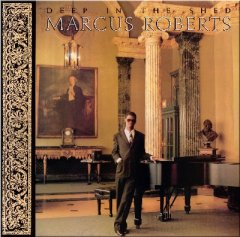
Deep In The Shed -- which comes in a cover of Roberts in a grand room, hardly the woodshed the title implies -- drops somewhere
between the grace of Ellington and the vigour of Monk. It’s a
serious record - then again, Roberts is a serious musician.
Take these comments as a fairly typical
example of his reply to a question about how outsiders are responding
to the growth and development of Marsalis and himself on record.
“It’s very difficult to hear a
record of somebody and understand what exactly it is they are trying
to do and what other artists they may be checking out. It takes daily
contact to know any person, so with Duke Ellington, for example, we
have 50 years of recorded music to reflect upon.
“But I have to wonder just how many
people really understand his music yet. It’s very difficult to deal
with it on any level of complexity because that music is so well
thought out and so sophisticated and complicated it is beyond most
people’s comprehension - including myself.
“You can‘t make any accurate or
definitive statement about that music in any depth.”
Yes. Roberts is a serious character and
sees his own music not simply as a form of self-expression but as
part of an important reclamation of the jazz tradition which was
somehow lost during the past three decades.
“A number of things occurred and certainly the free jazz movement lost touch with an audience. But also the music started being redefined and was taken off the bandstand, commented on and removed from a context.
"Then of course the leaders - John Coltrane, Pops - died and Monk stopped playing. There were no figureheads giving us direction.
“People like myself and Wynton grew up listening to Parliament and Funkadelic but playing those tunes isn’t going to teach you much about playing the piano or the sax or the trumpet.
“You get to meet a lot of pretty
girls and so there are those peripheral and attractive elements - but
they have nothing to do with the serious pursuit of music.“
That determinedly dedicated pursuit has
been articulated frequently (and with monotonous pomposity) by writer
Stanley Crouch who has been carrying the banner of the Marsalis
school of thinking on album liner notes. And he does it again on Deep
In The Shed - specifically placing Roberts at the centre of the
neo-conservative jazz renaissance.
Roberts rests comfortably with that but makes clear the technical gifts and knowledge he has acquired are there to be shared not for self-aggrandisement.
“I have no problem with pointing the
way and helping others but I also have no problem going to people
like (ex-John Coltrane drummer) Elvin Jones and asking him with great
humility for advice.
“If you are going to elevate people
through your endeavours you have a certain balance between
self-confidence and humility."
The idea of elevating his audience -
and reaching out beyond it to others - is a subject Roberts returns
to frequently.
“First we have to make this music
available and try to educate people. They may hear something and want
to pursue it so we should keep that musical option open.
“Just because rap has supplanted the
blues at this point doesn't mean that generations down the line won’t
take these documents (Ellington, Monk, his own recordings) seriously.
“When I play some Monk I'm trying to
give people a sample of, not so much Monk himself, but a music which
can arrive at that same level of sophistication.
“I can’t say, ‘Don't listen to
rap’ but what I want is for any kid of 15 years old in any part of
the world to be aware of John Coltrane or people like that and accept
his music as a valid alternative so he could get out and purchase a
record of it if he chooses. I don’t feel we‘re at that point yet.
I want to elevate and perpetuate high idealism throughout every
culture."
A half hour conversation with Marcus
Roberts is very much like talking to Wynton Marsalis - the same
dedication is apparent, the same themes emerge. Both deflect a lot of comment about
their own music towards the masters they have been "trying to
deal with."
Yet Deep In The Shed is such an
individual statement (more so than many Marsalis records where the
style can be heavily borrowed) that it seems remarkable he first
started playing jazz in public a mere five years ago. He seems to
have come twice as far as Marsalis and found his own voice in half
the time.
With its broad sweeps and subtle septet
arrangements, Deep in The Shade hints at what may be to come -- some
kind of suite in the manner of Ellington perhaps?
"Yeah, yeah - that's it," he
says enthusiastically. "I’d like a record to be a conceptual
statement in itself and I’m moving in that direction now.”
His next album, already recorded,
however, is of Monk, Ellington and Jelly Roll Morton tunes, just
"trying to deal with them."
The clues are better found in what he
is listening to as he takes his own small group on tour - tapes of Duke Ellington’s Far East
Suite and Charlie Parker With Strings.
Roberts may, or may not, have made the best album of the past decade with Deep In The Shed - that’s a matter of opinion.
But for only a second effort as leader
it is very impressive.
He's serious. Time to take him
seriously.



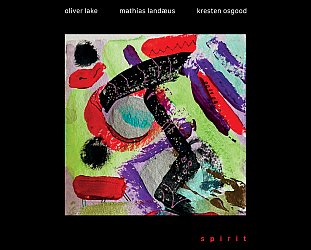
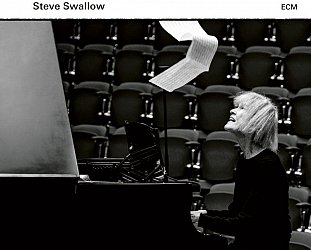
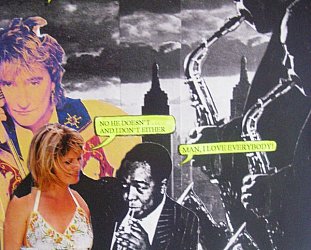
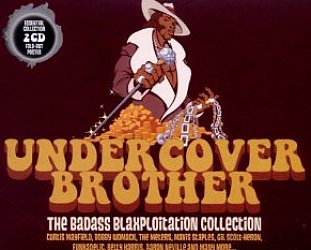
post a comment